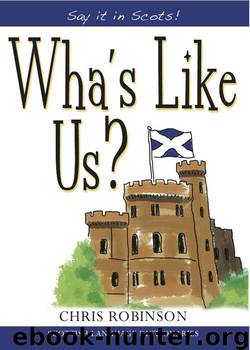Wha's Like Us? by Chris Robinson

Author:Chris Robinson
Language: eng
Format: mobi, epub
ISBN: 9781845028251
Publisher: Black & White Publishing
Published: 2014-02-28T11:00:00+00:00
6 Lust
Than lichery, that lathly cors,
Come berand lyk a bagit hors;
And Idilnes did him leid;
Thair wes with him ane vgly sort
And mony stynkand fowll tramort
That had in syn bene deid.
(WILLIAM DUNBAR)
[Then lechery, like a stallion, came bearing that loathesome corpse and Idleness led him; there was with him an ugly crowd and many a stinking half-decayed corpse that had died in sin.]
One sense of lust is simply pleasure, enjoyment or delight, as is obvious from the wholly innocent quotation from The Foly of Fulys and the Thewis of Wysmen (c1460):
Vysdome … is … suetar als and of mare lust Than erdly thing that man may gust
[Wisdom is sweeter and of more delight than any earthly thing that man may taste].
But then the killjoys got their hands on it and gave it additional senses of sensual or vicious pleasure, self-indulgence, and intemperance, excess and sexual promiscuity. So we find Gavin Douglas in the Prologue to his Aeneid (1513) making the rather world-weary comment about love:
Begynnyng with a fenyeit faynt plesance [false feeble pleasure], Continewit in lust and endyt with pennance
and John Knox roundly condemning those
Gevin to the filthy loostis of the fleshe.
This is understandable, given the behaviour described by William Dunbar in his Ballate Against Evil Women where he likens a woman who is not choosy about her partner to a bitch on heat:
Quhone the biche is jolie and on rage Scho chesis not the grewhound in the hour, The foulest tyk [scruffy dog] quhill scho hir lust aswage.
Women with such appetites would have been well pleased to meet these gentlemen:
The nychtis ar ouer schort to gentil men to commit there libedeneus lust
(SIR DAVID LINDSAY The Complaynte of Scotland 1549)
unless the shortness of the night is not a reference to their prodigious staying power but a comment on the long hours of summer daylight in Northern latitudes. In spite of their outwardly strait-laced attitude to sex, lust or love, the Scots have never had any difficulty talking about such things.
Auld fire – old flame.
An auld fire’s suin kinnelt.
Another version of this is listed in A. Henderson’s Proverbs (1832):
Cauld parritch is sooner het again than new anes made.
Bidie-in – The Daily Record (20 February 1995) sums this up neatly:
These days, couples are no longer introduced as husband-and-wife. This is the age of the ‘bidey-in’, the co-habitee, the ‘partner’, ‘live-in lover’ or ‘significant other’.
Biting and scratching – There is a saying that
Biting and scratching is Scots folk’s wooing.
Certainly over-elaborate protestations of devotion are rare except in songs and poetry.
Cheep, cheeper – a wee kiss.
Click, cleek – a boyfriend; a girlfriend; a potentially amorous contact made during an evening out. This is exemplified by Robin Jenkins in Fergus Lamont (1979):
“That big man in the kilt’s awfully interested in Glaikit Mary,” cried one of the girls. “Maybe he wants her for a click,” said another.
See Lumber.
Cutty-stool – the stool of repentance. Thomas Newte explains in Prospects and Observations, on a Tour in England and Scotland in 1785:
In most of the kirks there is a small
Download
This site does not store any files on its server. We only index and link to content provided by other sites. Please contact the content providers to delete copyright contents if any and email us, we'll remove relevant links or contents immediately.
| Dictionaries | English |
| Foreign Language Dictionaries & Thesauruses | Lexicography |
| Slang & Idioms | Synonyms & Antonyms |
| Thesauruses |
A Dictionary of Sociology by Unknown(2528)
The Dictionary of Body Language by Joe Navarro(2451)
The Art of Dramatic Writing: Its Basis in the Creative Interpretation of Human Motives by Egri Lajos(2428)
Merriam-Webster's Collegiate Thesaurus, Second Edition by Merriam-Webster Inc(2343)
Day by Elie Wiesel(2258)
How The Mind Works by Steven Pinker(2242)
0041152001443424520 .pdf by Unknown(2241)
The Meaning of the Library by unknow(2082)
The Official Guide to the TOEFL Test by ETS(1922)
The Emotion Thesaurus: A Writer's Guide to Character Expression by Puglisi Becca & Ackerman Angela(1874)
A History of Warfare by John Keegan(1732)
Emotion Amplifiers by Angela Ackerman & Becca Puglisi(1688)
MASTER LISTS FOR WRITERS: Thesauruses, Plots, Character Traits, Names, and More by Bryn Donovan(1638)
The Cambridge Guide to English Usage by PAM PETERS(1595)
Merriam-Webster's Pocket Dictionary by Merriam-Webster(1575)
Star Wars The Rise of Skywalker The Visual Dictionary by Pablo Hidalgo(1535)
Lucky Jim by Kingsley Amis(1374)
Word by Word by Kory Stamper(1369)
American Accent Training by Ann Cook(1357)
